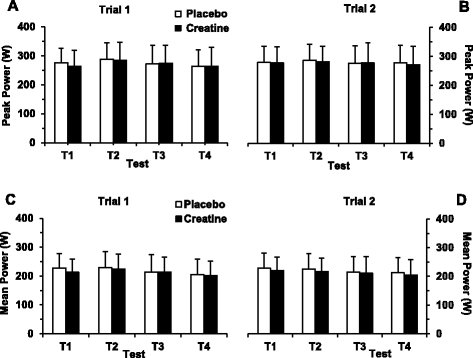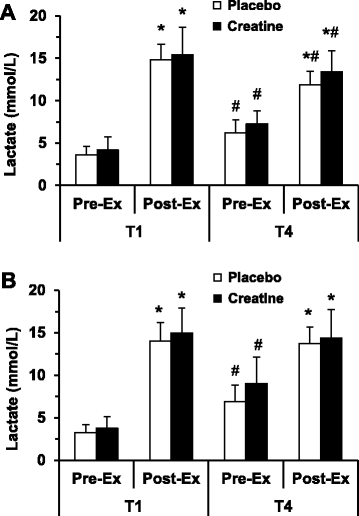Short-term creatine supplementation has no impact on upper-body anaerobic power in trained wrestlers
- PMID: 26664350
- PMCID: PMC4673838
- DOI: 10.1186/s12970-015-0107-6
Short-term creatine supplementation has no impact on upper-body anaerobic power in trained wrestlers
Abstract
Background: Creatine (CR) is considered an effective nutritional supplement having ergogenic effects, which appears more pronounced in upper-body compared to lower-body exercise. Nevertheless, results regarding the impact of CR loading on repeated high-intensity arm-cranking exercise are scarce and in some cases conflicting. Interestingly, few of the conducted studies have structured their research designs to mimic real world sporting events. Therefore, our purpose was to address the hypothesis that CR ingestion would increase anaerobic power output in consecutive upper-body intermittent sprint performance (UBISP) tests designed to simulate wrestling matches on a competition-day.
Methods: In a double-blind, placebo-controlled, parallel-group study, 20 trained wrestlers were assigned to either placebo or CR supplemented group (0.3 g ∙ kg(-1) of body mass per day). Four 6-min UBISP tests interspersed with 30-min recovery periods were performed before (trial 1) and after 5 days (trial 2) of supplementation. Each test consisted of six 15-s periods of arm-cranking at maximal executable cadence against resistance of 0.04 kg ∙ kg(-1) body mass interspersed with 40-s unloaded easy cranking periods and 5-s acceleration intervals (T1-T4). Mean power (MP), peak power (PP), fatigue index and heart rate parameters were measured during UBISP tests. Also, body weight and hydration status were assessed. Principle measures were statistical analysed with mixed-model ANOVAs.
Results: Mean individual CR consumption in the CR group was 24.8 ± 2.5 g ∙ d(-1). No significant (P > 0.05) differences occurred in body mass or hydration status indices between the groups or across trials. MP, PP and fatigue index responses were unaffected by supplementation; although, a significant reduction in MP and PP did occurred from T1 to T4 in both trial 1 and 2 (P < 0.001). Overall heart rate responses in the tests tended to be higher in the CR than PLC group (P < 0.05); but, trends in responses in trials and tests were comparable (P > 0.05).
Conclusion: These results suggest that 5-day CR supplementation has no impact on upper-body muscle anaerobic power output in consecutive UBISP anaerobic tests mimicking wrestling matches on a competition day.
Keywords: Brazilian Jiu Jitsu; Dietary supplement; Ergogenic aid; Physical performance; Submission wrestling.
Figures



References
-
- Burke L, Cort M, Cox G, Crawford R, Desbrow B, Farthing L, et al. Supplements and sports foods. In: Burke L, Deakin V, et al., editors. Clinical sports nutrition. 3. Sydney: McGraw-Hill; 2006. pp. 485–579.
Publication types
MeSH terms
Substances
LinkOut - more resources
Full Text Sources
Other Literature Sources
Miscellaneous
